Work Log: Apps, Templates, and Spreadsheets for Seamless Time Tracking

Keeping a work hours log is important for both individuals and companies to monitor productivity, bill clients accurately, and ensure compliance with labor regulations.
But logging your work hours through manual worksheets can take up a lot of time and focus for you or your employees. Plus, manual time tracking methods are extremely prone to human error and inaccuracies. So, what’s the best way to conveniently streamline this process? Easy—work hours log apps.
In this guide, we’ll explore why work hours logging matters and the benefits of it, as well as discuss how to choose the right method with real-life examples, and a comparison of the best work hours log apps available.
Let’s get into it!
Content outline
- What is a work log?
- Why is it important to create a work hours log?
- How to log work hours: best known methods
- Choosing the right method for logging work hours
- Benefits of logging work hours
- Work hours log apps vs. work hours log templates or sheets
- Best work hours log apps in 2024
- In-Depth Comparison and Evaluation
- Key Features of the Best Work Hours Log App
- DeskTime tips for maintaining an accurate work hours log
- Ready to start tracking?
- Frequently asked questions
What is a work log?
A work log is a tool used to track tasks, activities, and hours worked by individuals or teams. It helps document daily work, allowing for better management of productivity and time. By using a work hours log, you can record specific tasks, track time spent on each, and improve efficiency. Work logs are essential for project management, client billing, and performance reviews. They can be maintained using apps, templates, or spreadsheets, providing valuable insights into workload and time allocation.
Why is it important to create a work hours log?
A work hours log provides a detailed record of the time spent on tasks or projects. It’s important for professionals in various positions—managers, freelancers, consultants, or remote workers—to accurately track billable hours for client invoicing. While traditional methods like work hours log templates, sheets, or books may suffice, work hours log apps offer automation, extra features, and increased efficiency.
Using one of these apps, you can significantly boost productivity in your organization because you’ll be able to automate work hours logs, organize data more efficiently, and use additional features like reporting.

How to log work hours: best known methods
Tracking work hours is a vital part of managing productivity and ensuring accurate records for payroll, billing, or personal productivity. Understanding how to log work hours effectively can help you streamline processes and maintain accountability. There are various tools available, ranging from traditional methods to modern, automated solutions. Choosing the right way to log work hours can depend on your workflow, whether you prefer manual tracking or more automated options like a work log app. The best-known methods offer flexibility to suit different work environments.
Work Hours Log Template
A work hours log template provides a ready-made structure for tracking work hours efficiently. It typically includes sections for recording start and end times, breaks, and total hours worked. Templates can be customized for specific needs and are ideal for those who prefer a quick setup.
How to log work hours: to log work hours using a work hours log template, fill in the required fields such as start and end times, breaks, and total hours worked. Templates offer a structured, ready-made format to help you maintain consistency when recording your time across projects.
Work Hours Log Sheet
A work hours log sheet is a straightforward tool for manually entering work hours, widely used in industries requiring accurate time tracking. It provides a clear record of time spent on tasks, making it ideal for managing workloads. A daily work hours log sheet is a variation focused on day-to-day tracking, which is particularly useful for freelancers and small teams. This approach helps monitor productivity across various tasks, ensuring that daily activities are efficiently managed and recorded.
How to log work hours: using a work hours log sheet, you manually enter the hours spent on each task or project. Simply record your start and stop times daily, making sure to note breaks. This method gives you a clear overview of your daily work activity.
Work Hours Log Book
A work hours log book is a physical record of hours worked, used primarily in traditional work environments. It helps maintain consistent, manual tracking of hours and can be referenced for compliance or payroll purposes.
How to log work hours: for a work hours log book, write down your hours in a physical book each day. Include details like task descriptions and time intervals. This method is commonly used for manual tracking in traditional work settings.
Work Hours Log App
A work hours log app is a modern solution that automates time tracking, allowing users to record hours effortlessly. With features like real-time tracking, reminders, and reporting, apps are the most efficient option for individuals and teams looking to streamline their work hours logging.
How to log work hours: a work hours log app simplifies time logging by allowing you to start and stop timers or manually input hours. Most apps provide real-time tracking and generate reports, making it the most efficient way to log work hours automatically.
Choosing the right method for logging work hours
Exchanging your old Excel templates for a work hours log app will give you a lot of advantages. These apps streamline the time tracking process, allowing users to focus more on their work rather than administrative tasks. Plus, by providing insights into time usage patterns, work hours log apps can help employees manage their workload better and achieve a healthier work-life balance.
Meanwhile, efficient work hours management can contribute to increased productivity and profitability for businesses, allowing them to thrive in competitive markets.
Benefits of logging work hours
Overall, tracking work hours will make your organization more focused and help you allocate your resources better. Here are a few ways how keeping a work log can improve your daily productivity:
- Accurate invoicing
- Improved transparency in the workplace
- Better project management
- Compliance with labor laws
- Insights into work habits and productivity

Work hours log apps vs. work hours log templates or sheets
Work hours log apps and work hours log templates or sheets offer different approaches to tracking work hours. Here’s a comparison of pros and cons for each:
Work hours log apps
Pros:
Automation: Apps automate time tracking, reducing manual effort and ensuring accuracy.
Additional features: They often come with features like reporting, reminders, and integration with other tools.
Accessibility: Apps can be accessed from anywhere with an internet connection, including mobile devices.
Customization: Users can often customize settings to fit their specific needs and preferences.
Real-time tracking: Apps provide real-time insights into work hours, allowing for immediate adjustments.
Cons:
Cost: Some apps require a subscription fee, which may not be feasible for all users.
Learning curve: Users need to learn how to use the app effectively, which can take time.
Work hours log templates/sheets
Pros:
Simplicity: Templates/sheets are straightforward and easy to use, requiring minimal setup.
No dependency on technology: They don’t rely on technology, so there’s no risk of technical issues disrupting tracking.
Cons:
Manual input: Tracking work hours requires manual input, which can be time-consuming and prone to errors.
Limited accessibility: Access to templates/sheets may be restricted to specific devices or locations.
Difficulty in analysis: Analyzing data from templates/sheets may require additional effort compared to apps with built-in reporting features.
Best work hours log apps in 2024
Choosing the right work hours log app can significantly impact your productivity and workflow efficiency. When comparing these apps, it’s essential to consider key factors such as price, automation, extra features, customization options, and Capterra ratings. Evaluating these aspects will help you make an informed decision and select the app that best suits your specific needs and preferences.
| App | Price | Automation | Features | Customization | Capterra Rating |
| DeskTime | from $7/user per month | ✔️ | Automatic time tracking, productivity analysis, project tracking | ✔️ | 4.6 |
| Harvest | from $10/user per month | ✔️ | Automatic time tracking, invoicing, project management | ✔️ | 4.6 |
| TimeCamp | from $2.99/user per month | ✔️ | Automatic time tracking, project management, reporting and analytics | ✔️ | 4.7 |
| Buddy Punch | from $29/month for up to 10 employees | ✔️ | Automatic time tracking, employee scheduling, reporting and analytics | ✔️ | 4.8 |
| Hubstaff | from $7/user per month | ✔️ | Automatic time tracking, employee monitoring, project management | ✔️ | 4.5 |
In-Depth Comparison and Evaluation
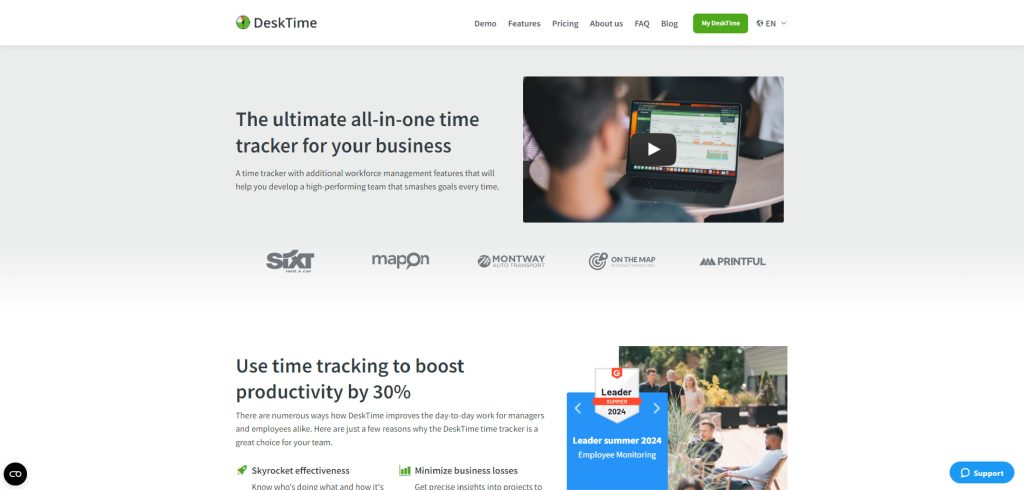
DeskTime
DeskTime is a highly customizable time tracking and productivity tool designed to help individuals and teams optimize their work hours effectively. With automatic time tracking features, DeskTime captures work hours accurately, allowing users to monitor productivity levels and analyze time usage patterns.
Its intuitive interface and customizable settings make it easy to track billable hours, manage projects, and generate insightful reports. DeskTime also offers advanced features such as productivity analysis, project tracking, and integrations with other popular project management tools, like Jira, Trello, and more, empowering users to improve their time management and achieve better work-life balance.
Overall, DeskTime is a valuable tool for professionals seeking to boost productivity and streamline their work hours management.
Price: from $7/user per month
Capterra Rating: 4.6
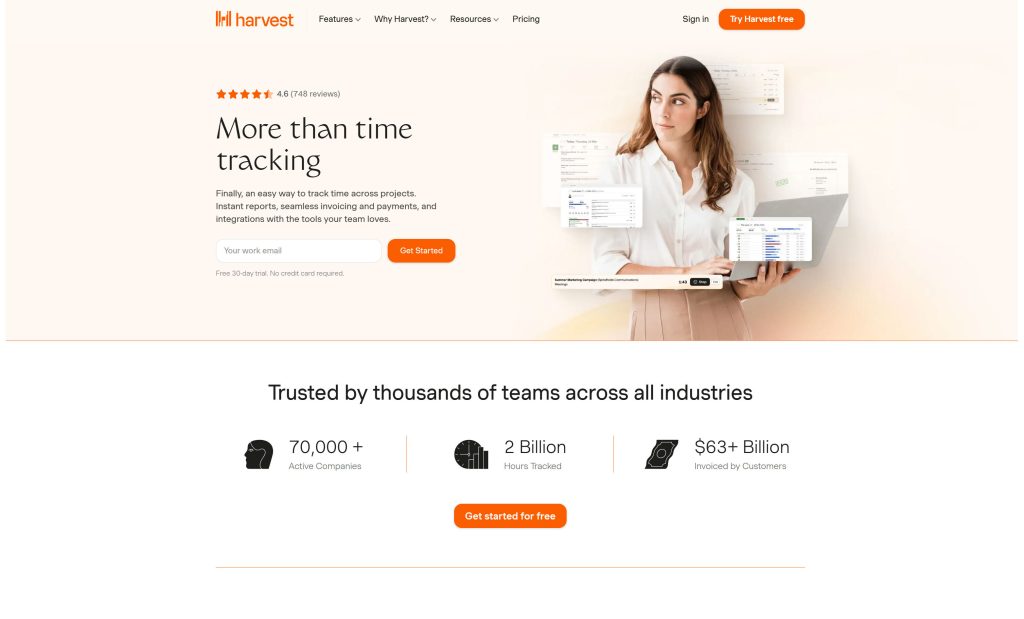
Harvest
Harvest is a versatile time tracking and invoicing tool tailored for freelancers, small businesses, and remote teams. With its user-friendly interface and robust features, Harvest simplifies the process of tracking billable hours, managing projects, and invoicing clients. Users can easily track time across different tasks and projects, generate professional invoices, and monitor project budgets in real time.
Harvest also offers integrations with popular accounting software and project management tools, enhancing workflow efficiency. Whether you’re a freelancer looking to streamline invoicing or a small business aiming to improve project management, Harvest provides the tools needed to streamline time tracking and billing processes.
Price: from $10/user per month
Capterra Rating: 4.6
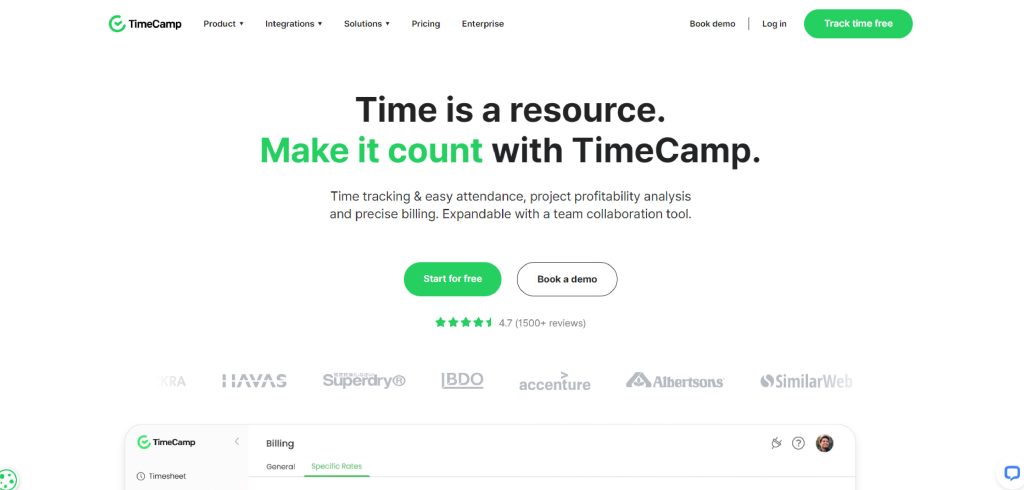
TimeCamp
TimeCamp is a time tracking and project management solution designed to help individuals and small teams optimize their productivity. With its automatic time tracking feature, TimeCamp accurately records time spent on tasks and projects in real-time, eliminating the need for manual input. Users can easily track billable hours, monitor project progress, and analyze time usage patterns through insightful reports and visual dashboards.
TimeCamp also offers some project management tools, including task tracking, resource allocation, and budget monitoring. Whether you’re a freelancer, remote team, or small business, TimeCamp provides the tools needed to streamline time tracking and project management workflows.
Price: from $2.99/user per month
Capterra Rating: 4.7
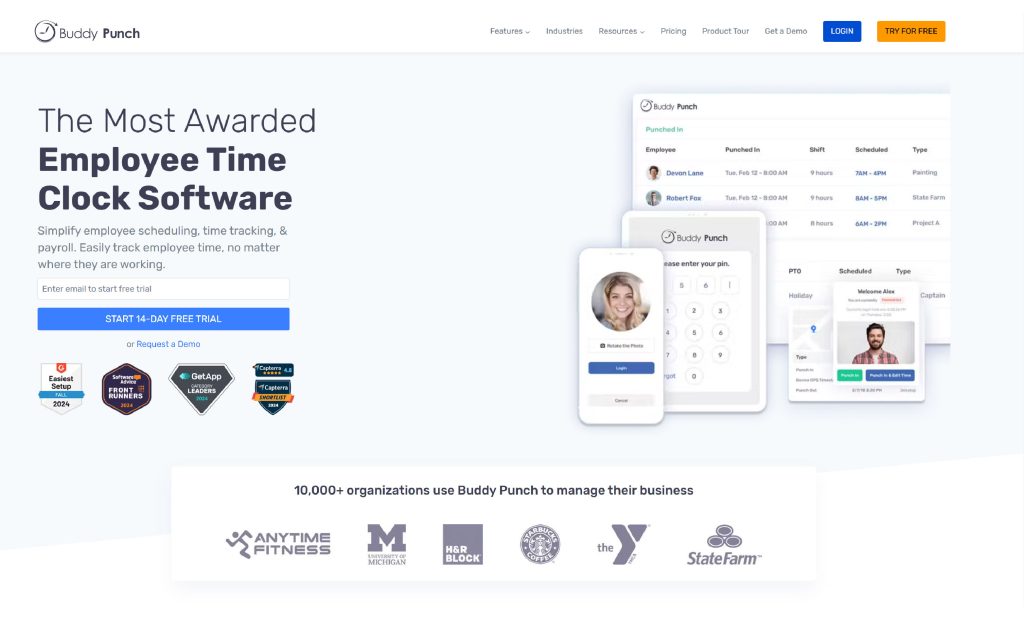
Buddy Punch
Buddy Punch is a time tracking and employee scheduling software designed to streamline workforce management for businesses of all sizes. With its intuitive interface, Buddy Punch simplifies the process of tracking work hours, managing schedules, and enforcing attendance policies. Users can clock in and out easily using various methods, including biometric verification and mobile app integration.
Buddy Punch also offers reporting capabilities, allowing managers to generate reports on employee attendance, work hours, and overtime.
Price: from $29/month for up to 10 employees
Capterra Rating: 4.8
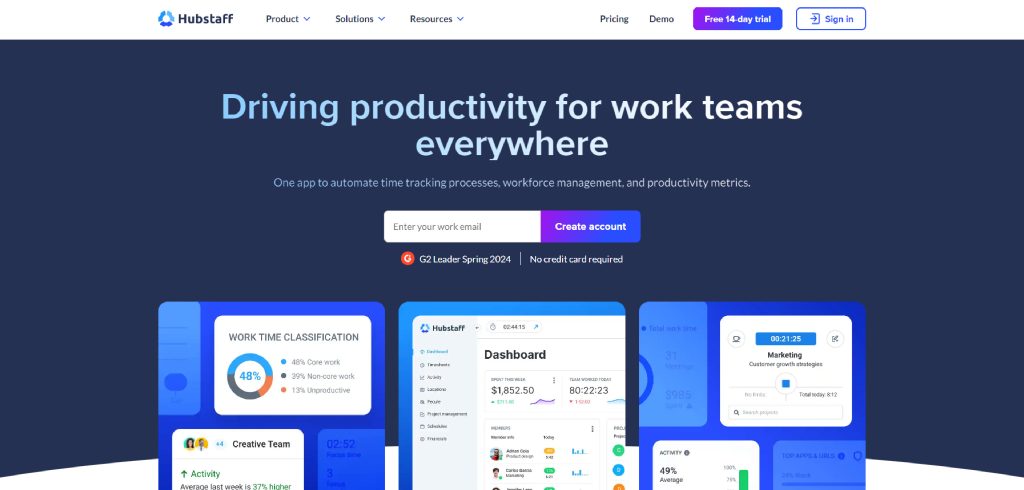
Hubstaff
Hubstaff is a time tracking and productivity management software designed for remote teams and freelancers. With its advanced features and user-friendly interface, Hubstaff allows users to accurately track time spent on tasks and projects, monitor productivity levels, and manage remote teams effectively.
The software offers automatic time tracking, activity monitoring, and detailed reports to help businesses optimize productivity and streamline workflow processes. Additionally, Hubstaff integrates with various project management and payment processing tools, making it a versatile solution for businesses of all sizes. Whether you’re managing a remote team or working as a freelancer, Hubstaff provides the tools needed to boost efficiency and accountability.
Price: from $7/user per month
Capterra Rating: 4.5

Key Features of the Best Work Hours Log App
The best Work Hours Log App combines multiple features to ensure efficient time tracking and productivity management.
- Ease of Use: A simple, intuitive interface that allows users to start tracking without a steep learning curve.
- Automation: Automatic tracking reduces manual effort, improving accuracy and saving time.
- Customizable Reports: The app should offer flexible reports that can be adjusted to individual or team needs.
- Integrations: Seamless integration with other tools like project management or invoicing software enhances workflow.
- Mobile Access: A mobile-friendly version ensures you can track time on the go.
DeskTime tips for maintaining an accurate work hours log
Ensuring the accuracy of your work hours log is crucial for effective time management and productivity. To maintain an accurate record, consider the following tips:
- Set clear expectations and guidelines for time tracking to ensure consistency and accountability.
- Regularly review and reconcile time entries to identify any discrepancies or inaccuracies.
- Utilize reminders and alerts to ensure compliance with scheduled work hours and breaks.
- Encourage open communication and feedback from team members to address any issues or concerns related to time tracking practices.
An effective work hours log is crucial for professionals and businesses to track productivity, bill clients accurately, and ensure compliance with labor regulations. Work hours log apps offer a convenient solution with automation, extra features, and enhanced efficiency. By choosing the right app and following best practices, individuals and companies can optimize their time tracking process and improve overall productivity.
Ready to start tracking?
Keeping a work log will make life easier for you. Make sure you choose the right app for you and follow the best practices. If you’re not sure how to implement a work log app in your organization, take a look at how Skrivanek, a global language agency with a team of over 300 people and offices all across the world, did it. If you want to try out a work log app for free, take a look at our demo account—here, you’ll be able to see how DeskTime features work. Or, you can always sign up for a free trial.
Frequently asked questions
What is a work log?
A work log is a record used to document daily tasks, activities, and hours worked. It helps track productivity, ensures task completion, and supports time management. Popular methods for creating a work log include using templates, spreadsheets, or apps.
What is a daily work log?
A daily work log tracks activities and hours on a day-to-day basis. It’s ideal for monitoring daily productivity. In contrast, a project work log focuses on long-term tasks, allowing you to track specific project progress over extended periods.
What is the purpose of a work log?
The purpose of a work log is to document tasks, track time, and enhance productivity. It also helps improve work-life balance, team management, billing accuracy, and overall efficiency by offering insights into how time is allocated.
What is a work hours log app?
A work hours log app automates time tracking, providing features like timers, reporting, and integrations with other tools. These apps have grown popular in recent years due to their ability to help teams manage daily work efficiently, improve collaboration, and simplify billing processes.
How to choose a work log app?
When selecting a work log app, consider factors like ease of use, automation, report customization, software integration, and mobile accessibility. It’s important to compare various tools to find the one that best suits your needs. Use our comparison guide for detailed insights.
Did you find this article useful? Give it a clap!
Psst! You can clap more than once if you really loved it 🙂